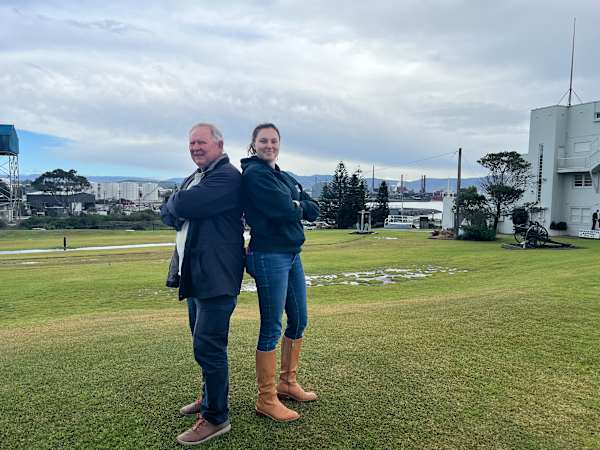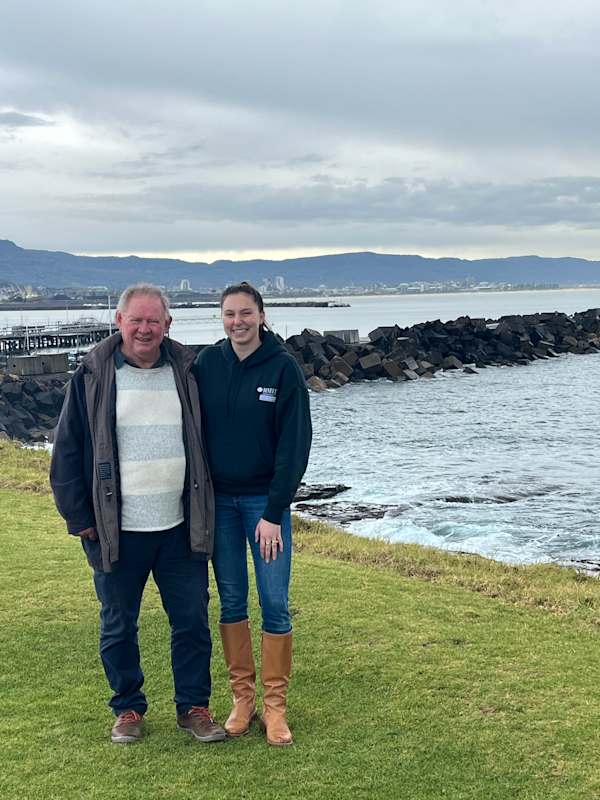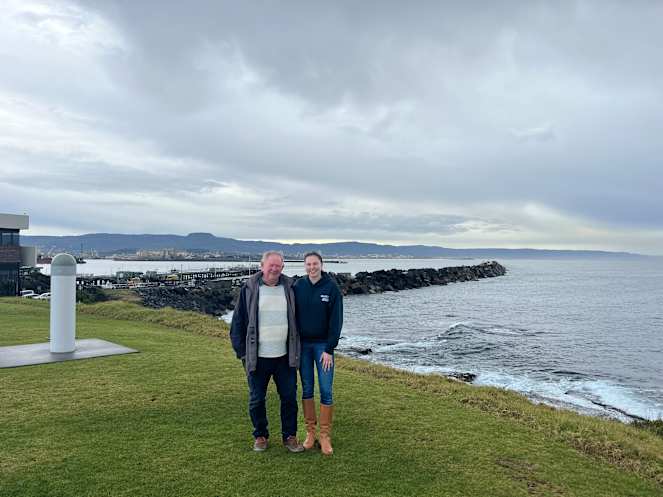Darryl Best and Phebe Fidge are both Illawarra locals and regular contributors to the Illawarra Flame. Despite their vastly different backgrounds – Darryl having worked in coal mines most of his life and Phebe just beginning her career in marine ecology – they share a passion for climate action and a just transition to net zero. Darryl is from the Baby Boomer era, Phebe from Gen Z – they are separated by an age gap of almost 50 years. Usually Darryl would spend weekends in his garden, cooking, enjoying time with family and friends, and a nice red wine, while Phebe would be out scuba diving, kayaking or hiking. But one rainy Saturday, these two trailblazers from different walks of life came together to offer their perspectives on the future of renewable energy in the region, and to discuss a common path forward.
These are the questions they asked each other.

When did the reality of climate change really hit you?
Darryl: I love wine, and visiting different wine regions. About 20 years ago, while on a trip, winemakers I met told me they had to change when they harvest grapes by a month, and needed to start planting different varietals because they wouldn’t grow in the area anymore – it was too dry or too hot. I thought – now this is real – it’s not just the fires and floods but everything we try to grow. But that was 20 years ago and I didn’t leave the coal industry until five years ago. It’s easy when you work in a coal mine with other people and forget about climate change and just get on with it, you don’t have the desire or the opportunity to change anything. But climate change and the damage that burning coal is causing is one of the reasons I left the industry and why I work so hard now to promote climate action.
Phebe: There was a really impactful moment during my first year of university. I did a subject called Global Challenges in Biology and in one lecture they canvassed the impacts of climate change being observed in Antarctica over the last 20 years. I cried, because I didn’t realise it was that bad and I was shocked that we, as a global community, had let this amazing place deteriorate. This lecture clearly brought it into frame that the impacts I had assumed were still far off were in fact already happening, and so little was being done to stop them. I felt this deep sense of injustice because my children may never get a chance to see how beautiful the glaciers and the coral reefs of our world are.
Have you noticed any adverse effects from climate change in your day to day life?
Phebe: I love the scuba diving sites around Bass Point Reserve in Shellharbour. I spend a lot of time at “The Gutter”, where we’ve started seeing species pop up that should be in the tropics. We’ve seen imperial shrimp local to the Indopacific and turban snails that must have come down from northern NSW. At first it’s amazing to see something different, you get excited! But then you start to notice that other species are disappearing, like the bastard trumpeter fish, and certain cold-water kelps. Not only that; community dynamics are shifting. Urchins are thriving in warm, overfished seas, leading to overgrazing and the expansion of “urchin barrens”. One day you’ll be swimming over this amazing kelp reef swarming with fish, and the next a graveyard – it’s just a white moonscape – I’m talking one month to the next. That's pretty confronting.
Darryl: When I was a kid growing up in Lithgow NSW I remember the thick sulphur of the air on a misty night. It was yellow and you could smell it and you’d think that can’t be doing any good. It was because everyone had coal heaters since there were coal mines everywhere. At some point the council brought in an initiative where you got $300 to get rid of your coal heaters and the whole atmosphere of Lithgow completely changed. And when I think about that now I think this is what’s still happening, this is the harmful effects of coal burning, but it’s now invisible. So my mother still lives on 40 acres just outside Lithgow and the 2019 fires completely circled her property, and then there are the massive floods floods, and they’re all worse than the last one. That’s been what I’ve noticed over my lifetime that these disasters have gotten more common, more intense. We’re getting to the stage where people can't insure their homes. Well, my generation at least, since Phebe’s can’t afford homes at all.
What motivated you to advocate for renewable energy technologies such as offshore wind?
Phebe: As a marine ecologist I had initial concerns about the impact on the marine environment of offshore wind farms so I did what I do best –research. If you look at the scientific literature exploring potential impacts of offshore wind on the local marine environment, economy, and community, it is clear that the enormous benefits of turbines at that scale are going to far outweigh any adverse effects. So now I strongly support the development of large-scale renewable investment in the Illawarra because it is the logical course of action. It's the best thing for our coastline in that it will fuel the blue economy while addressing climate change, which is the biggest threat to our oceans. So I am motivated by frustration of past inaction but also by hope because there is a clear path forward. For those who have been opposing offshore wind in the Illawarra, your energy will be better spent ensuring any developments that do go ahead are sustainable and provide community benefits.
Darryl: I worked all my life in coal mining but towards the end I started to see the devastating effects climate change was having on our planet. This made me want to do something, for my family and the generations to come. Let’s face it, as a coal miner I have a long way to go to be carbon neutral. I also saw renewable industries as a good pathway for workers like myself in fossil fuels to transition into and that’s why it’s important for governments to ensure that renewable industries are established in areas that have existing fossil fuel industries, like the Illawarra. The transfer of skills is easily achieved with re-training, and that keeps communities thriving and families together.
How will your generation benefit from greater access to renewable energy?
Darryl: A lot is said about my generation being wealthy and owning multiple houses, but the reality is that’s just a small percentage of people. Most just see their retirement funds dwindling and the cost of energy increasing. Renewable energy is cheaper, so that will help. There will also be fewer health issues with cleaner air, which helps as you age. But it’s also about ensuring a better future for our grandkids. What has happened to my generation? We protested for women’s liberation, for human rights, and against the Vietnam War. So seeing those same people resisting change in the Illawarra really annoys me. Change is scary as you get older and it is hard to admit that some of what we did has helped to cause this climate crisis. There are two things I’ve tried to change over the past five years, one is that people stop blaming fossil fuel workers – give them an option and they’ll get out. The other is crossing that generation gap – speaking to people a lot younger than myself, like Phebe. It just breaks my heart that people my age don't want to change to help the future generations, because why wouldn't you?
Phebe: Renewable energy means a reduction in emissions and therefore less global warming and a more liveable future for my generation and those to come. It would also reduce air pollution and associated risks to human health, and cost-of-living pressures would ease with lower household electricity bills. Emerging renewable energy industries like offshore wind would also bring future-proof “green jobs” for young people in the Illawarra. We have a lot to gain, and a lot to lose. We are the last generation that can do anything to limit global warming to less than 2°C by 2100 and avoid ecological catastrophe, but this requires rapid, progressive and disruptive changes. It also requires strong climate targets from member states of the Paris Agreement including Australia. Net zero is not a choice, it’s a necessity.
What can the government do to ensure communities benefit as a whole from renewable energy?
Phebe: It is crucial that communities experience tangible benefits of large-scale renewable projects. This can be achieved through practical demonstrations and the creation of local energy hubs, which would serve as centres for public consultation and education. The transition to renewable energy must be community-centred, fostering inclusive engagement with diverse stakeholders, including youth and Traditional Owners. While "Not in my Backyard" sentiments are often dismissed as selfish, place-protective actions can reveal legitimate psychological risks. These risks should be acknowledged and managed with the same consideration given to environmental, cultural, and socio-economic concerns. It is vital that all community members feel heard – but logical voices must prevail over loud ones.
Darryl: The government can include compulsory community benefits written into every licence given to each renewable project. This guarantees that the companies work with and help the communities. The government can also ensure that each community is aware of what they can negotiate with renewable energy companies and also showcase the successful community engagement programmes, such as the township of Hay in NSW. They should promote genuine information-sharing platforms for communities with proposed renewables initiatives.
What’s your vision of the Illawarra of the future?
Phebe: I look forward to an Illawarra where renewables are the largest employers – where they are mundane, not controversial. Young people will have good green jobs, and won’t be afraid anymore. More than 50 percent of people aged 15 to 25 years old today express feelings of eco-anxiety, but in the future we’ll be in a position where we can feel hopeful because people care and there is political will to enact positive change. My scuba diving environment might look different but it will be beautiful because we’ll be living in harmony with nature instead of always working to destroy it. We will be net zero and nature positive.
Darryl: In 20 years' time there’s going to be a lot of renewables in the Illawarra and we’ll be producing green steel, which will keep the whole place employed and very vibrant. The Phebes of the world will have made sure we did it without affecting anything badly. So wind farms will be the norm and we might hear that there was that one time in 2038 that a whale ran into something but it’s nothing compared to the 5000 dead ones we found decades before down the coast because they had no food. I think there are enough really good people working so hard to get it like that, even if I don’t live to see it. I want to have written on my gravestone: “If only he could see this now.”

Read more
‘Sunlight is the best disinfectant’: How independent media is shining a light on renewables in the regions


